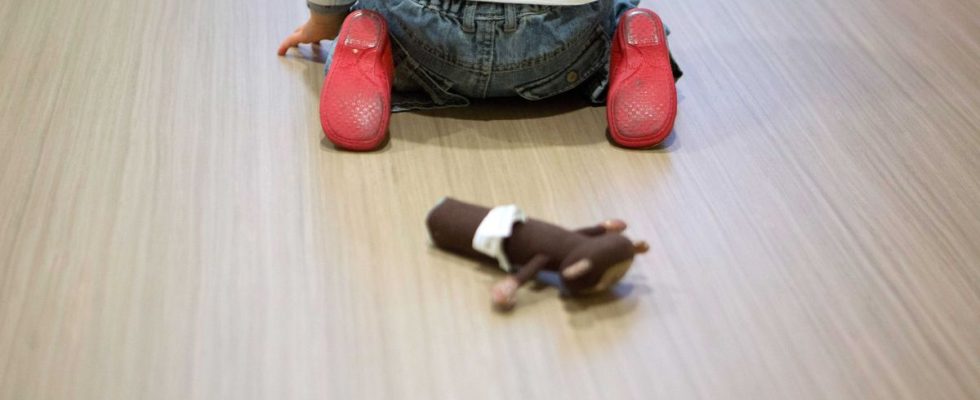Almost a year ago, on June 22, the life of little Lisa, 11 months, came to an abrupt end. Barely an hour after being dropped off at the crèche by her father, the girl swallowed caustic soda, an extremely harmful cleaning product. According to the first elements of the investigation – still under investigation – she was forced to ingest the product by a professional who admitted having sprayed her with it, overwhelmed by her tears. A month after this case, and faced with the multiplication of testimonies of abuse, the Minister of Solidarity, Jean-Christophe Combes, launched an investigation into the reception conditions in structures for toddlers. And the results, published on Tuesday, by the General Inspectorate of Social Affairs (Igas), are edifying.
The study, which covers some 16,000 structures (public crèches, micro-crèches, drop-in daycare centres, etc.), highlights a “particularly heterogeneous quality of reception”: crèches “of high quality, supported by in-depth educational reflection” cohabit with “establishments of very degraded quality”, note the authors of the report, not hesitating to draw a parallel with nursing homes. “The facts reported are identical to those observed in any reception of vulnerable and dependent people: negligence due to organizational constraints that take precedence over the needs of the person received, non-respect of individual rhythms, devaluation, humiliation , forcing, verbal and physical violence…”, they insist.
2,000 testimonies of abuse
To reach such a conclusion, the investigators visited 36 public or private establishments and distributed an anonymous questionnaire to which 5,275 directors, 12,545 daycare workers and 27,671 parents responded. If certain practices can make you smile – like those establishments which claim to be bilingual when no one speaks a word of English and which broadcast recordings in the language of Shakespeare – the majority of feedback sends shivers down your spine. A quarter of the respondents to the “professional” questionnaire indicated that they had already worked in an establishment which they considered to be abusive towards children. Admittedly, this does not mean that a quarter of crèches are subject to reprehensible behavior – these reports have not been verified and the same establishment can be targeted several times – but these elements constitute, at the very least, warning signals . Especially since some 2,000 testimonies going in this direction have been collected.
“The headmistress forced her to eat until she vomited. “Children tied to the radiator on a chair.” “Forcing a child to eat by holding his mouth. “Pulling a child’s hair to show them what it feels like.” “To sit on a child so that he stays in his bed on the floor. » « Putting a child to bed because the colleague can’t stand it anymore. The reading of the verbatims – more than a hundred are transcribed in the report – is dizzying. The authors note that, paradoxically, the question of mistreatment in these establishments remains “unthought of”, both by parents and by many managers and managers of structures. “This conviction is based on the feeling that control between professionals within establishments is sufficient to prevent mistreatment: the fact that it is an almost entirely female universe and oriented towards babies does not seem to be foreign to this belief. »
“Don’t give anything to drink, that way you change diapers less”
“Mistreatment does not only concern situations of violence, but also acts of neglect, including on an ad hoc basis, specifies the report. Thus, the lack of care given to children, due to the constraints weighing on the staff and on the structure, falls within the scope of abuse. Here again the examples support the remarks. The testimonies of children who stay all day with the same diaper, infants who cry for lack of attention are legion. There are also these stories of toddlers that we forget in the dormitory or even outside, of this baby “that we forgot to feed for a whole day”. In some structures, this lack of care even seems institutionalized: a professional says that in her structure the rule is “not to give drinks like that, we change diapers less”.
Several elements have been put forward to explain this situation: degradation of working conditions, linked in particular to recruitment difficulties, insufficient training, supervision rate unsuited to the needs of young children. “Such a drift can be reinforced by logics of profitability which seem to transform the activity into flow management, or even limit the response to the needs of the child in economic logics (pressure to limit the number of nappies or gloves used by day, insufficient quantity of food, etc.), continue the authors. To remedy this, Igas recommends a “cultural change” and issues 38 recommendations. The Minister of Solidarity assured, Tuesday, on his Twitter account, that “all the recommendations” will be taken into account, in particular within the framework of the “public service of early childhood”, promised by Emmanuel Macron.

